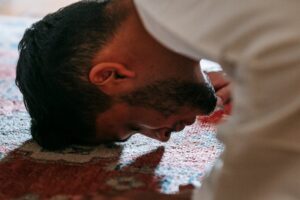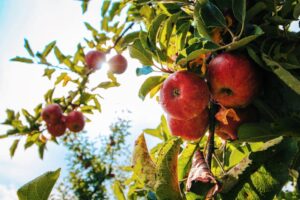Growing up overseas had a certain flavor during Ramadan to me. Next to the challenge of fasting long hours, as I remember it being the summer months 40 years ago, everything else was exciting and joyful. We always had a Sayaran[1] before the first day of Ramadan in the spirit of saying goodbye to daytime meals. We would choose a beautiful nearby nature setting, next to Moses River as we called it, and it was all about barbeque and playing while the adults talked about politics and the effects of the Lebanese civil war on people’s lives.
There was nothing more fun on the first night of Ramadan than waking up to the sound of the Musaher’s[2] drum as he would chant rhymes that included making Salam on the Prophet (SAAW) and urging people to wake up. My favorite part of the Suhoor was the mix of watermelon and special herbed cheese called Shankleesh. The days of Ramadan were a mix of spending time with family, playing, keeping up with prayers, and attending special Ramadan classes at the local school for memorizing Quran and studying the Seerah of the Prophet. (SAAW)
Asr time was the toughest, because I would help my mother prepare the food. As we all know, Muslims and Arabs are very creative when it comes to Iftar dinners during Ramadan. I would make multiple trips walking up the hill to the grocery store because my mom would never remember all the things she wanted at the same time! I had to shell all the almonds and pecans that were harvested from trees we grew and clean them to be used for the food. Preparing the fire for cooking and cleaning the veranda outside of the house where the food would be served was also part of my duties.
It was all worth it, as I would smell the enticing aroma of food being cooked and waiting for the Azan to be called at Maghreb, I waited in excitement and joy. I remember I used to climb on the roof of the house and join the Moua’zzen in calling for Azan from the age of 9! The most beautiful part was when we all sat as a family – parents, grandmother, siblings, and we always had other extended family members joining us for Iftar. I remember my dad would bring us a special Ramadan drink of Carob juice (Kharnoob) and whatever fruits he could grab from local farms. My mom was an expert in making sweets during Ramadan, all kinds of sweets, from cakes to custard to baklava. I believe her expertise in Ramadan sweets hooked me on loving sweets even till now. After Iftar dinner, all the men and boys would walk towards the Masjid to pray Taraweeh. Oh, how easy that was back then. Sheikh Muzhar would finish Isha and Taraweeh in less than 20 minutes. He would literally read one Ayah per Raka’h! There were no speeches between Taraweeh nor fundraising. They had the habit of repeating certain Zikr after four Rak’at for a very short time.
Because of the civil war, we had no electricity to watch tv, so we mainly depended on fictional stories for entertainment, told by my aunt visiting from the neighboring village or by my grandmother who lived with us. Another tradition I remember was toward the end of Ramadan we had the best time going shopping for our new clothes for Eid. Each kid would get a new shirt, pants, and shoes. After that, all the shopping for the special Ramadan sweets was done too. Ma’moul filled with dates, pistachios, or pecans.
On Eid morning, I always broke my fast on Ma’moul, and started walking with my dad and brothers to Salatul Eid where the Takbeer echoed through the valley of our beautiful village, Berqayel, in Northern Lebanon. Everyone, especially the kids, were well-dressed, walking with family members towards the Masjid. After that, we would walk towards the cemetery and read Fatiha for every person who died from our family. Yes, there were so many, but it was a moment to remember those who passed away, so we made prayers for them.
Since both of my parents were the eldest among their siblings, our house would be continuously occupied by our uncles and aunts visiting us from both sides of the family during the three days of Eid. The cultural tradition was that younger ones visited the older ones, and I had the best of times with my family and cousins.
As I look back and cherish such beautiful memories of our traditions in Lebanon, alhamdulillah, I am also grateful for being part of this community now. We are here now in Chicago with our own families and children, blessed with many practices of faith that makes our experiences in Ramadan very spiritual. Praying Taraweeh, finishing the whole Quran, and being active in donating to the needy and poor around the world through visiting relief organizations, are beautiful practices that we all should be proud of. The group Iftars, the special Night of Qadr, Qiyam and Suhoor, and the Eid prayers that bring all the community together is a great way of celebrating the spirit of Ramadan.
Ramadan now has a new flavor. It may not be the same flavor that many of us who immigrated here remember from our childhoods, but it is the flavor that our children will remember. The diversity of our cultures and the practices we hold steadfastly will produce a culture of traditions for the month of Ramadan that future generations will inherit and become the American Ramadan Culture as unique as any Muslim Community around the world, insha Allah. Today we are creating the cherished memories of tomorrow.
I pray and wish you a blessed Ramadan of the year 1439 from the Hijrah of the Prophet. (SAAW)
Ramadan Mubarak
By Sh Kifah Mustapha
[1] Picnic
[2] Drummer who wakes people for suhoor




